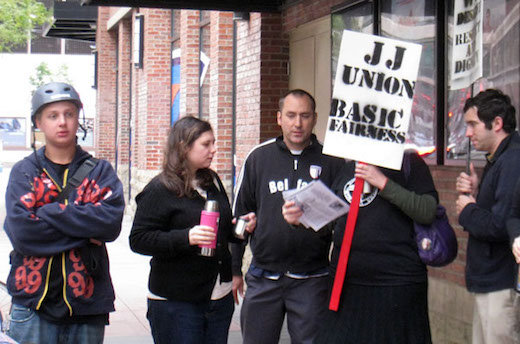Ask any person not directly employed in the arts or finance, and she will tell you that work sucks. It’s weird, because our parents and grandparents talked as if work were the best thing in the world, or at least a primary source of meaning in their lives. Then somewhere between Vietnam and Office Space, the indignity of the office became a standard motif in movies and television. That conceit seems almost quaint in a 21st-century employment landscape that features full-time “contract” work, wage theft, and stagnant pay. In a book called The Fissured Workplace, Boston University professor David Weil argues that work has become “debased” by management structures that separate employers from employees. Two other authors, Applebaum and Batt, see that as the inevitable outcome of three decades of leveraged buyouts.
That’s a lot of links to throw at you. If you’re looking for a succinct and readable distillation of how those two books relate to each other and to the debasement of American work, I recommend this review by Robert Kuttner. In order to read the whole thing, though, you have to subscribe to The New York Review of Books. I assume you do. But because I have been wrong before, and because no one can see the new links anyway, I’ll quickly summarize Kuttner’s ideas. Just remember that they’re his and those of the authors under review, not mine.
Kuttner takes up Weil’s argument that since the 1980s, large corporations have focused their strategies on brand identity and relationships with consumers at the expense of relationships with their employees. Often, the employer-employee relationship is formally and/or legally severed by intermediaries—temp agencies, long-term “contractor” employment that pretends full-time workers are freelancers, and good old outsourcing. Quote:
This system, which began in peripheral occupations such as janitors or security guards, has become pervasive. FedEx workers wear the company’s uniforms, drive its trucks, and adhere to stringent rules; but they are independent contractors, not company employees. At many leading hotels, room cleaners and desk clerks actually work for management companies, not for Marriott or Hilton.
The result is that many large corporations feel few obligations to the people who work for them. The legal separation between FedEx and a “contractor” it employs for 37 hours a week becomes a psychological separation. Management feels less incentive to build a stable base of experienced, happy employees, because the people who deliver FedEx packages theoretically aren’t part of the company. It’s cheaper to hire freelance contractors to do the same work as full-time employees, because contractors don’t get benefits, resist unionization, and are easier to fire. And for the last few decades, what’s cheapest has dictated the relationship between employer and employed.
That’s Applebaum and Batt’s argument, anyway. They believe that the leveraged buyout model encourages companies that fall under the control of private equity to cut costs by reducing pensions and other benefits that make work bearable. The authors cite Wilbur Ross’s 2002 buyout of several bankrupt steel mills—an undertaking that enjoyed union support and is frequently held up as an example of a good LBO—in which his $4.5 billion net profit equalled the amount lost from employee pension plans.
Taken together, Weil and Applebaum & Batt make a convincing argument that work has gotten awful because finance has become so much more powerful than labor. When one of the major political parties hates unions and both agree that what’s good for Wall Street is good for America, you get things like noncompete clauses for Jimmy John’s employees. This is what Kuttner means when he says that work has become debased. Employers think it’s appropriate to make hourly workers who don’t get benefits sign agreements not to work at other sandwich shops, and employees acquiesce because that’s the standard we have established since the 1980s.
The irony of this approach is that while it enriches investors, it’s bad for both employees and customers—two demographics that include almost everyone in America. If you don’t know someone who hates his job, you almost certainly know someone who hates the customer service she gets from her cable company. As a nation, we have made work a central focus of our lives, but we have also made it suck. It’s not a coincidence that work got more degrading during the same period that investment got more profitable. But is it something we would ever do on purpose?





Whats “analyst”?
Is that someone who’s continued business model hinges on supplying a product for the customer?
I like academic D.Brooks, even if his conclusions creep out of employment economics and into whether American culture cherishes its work.